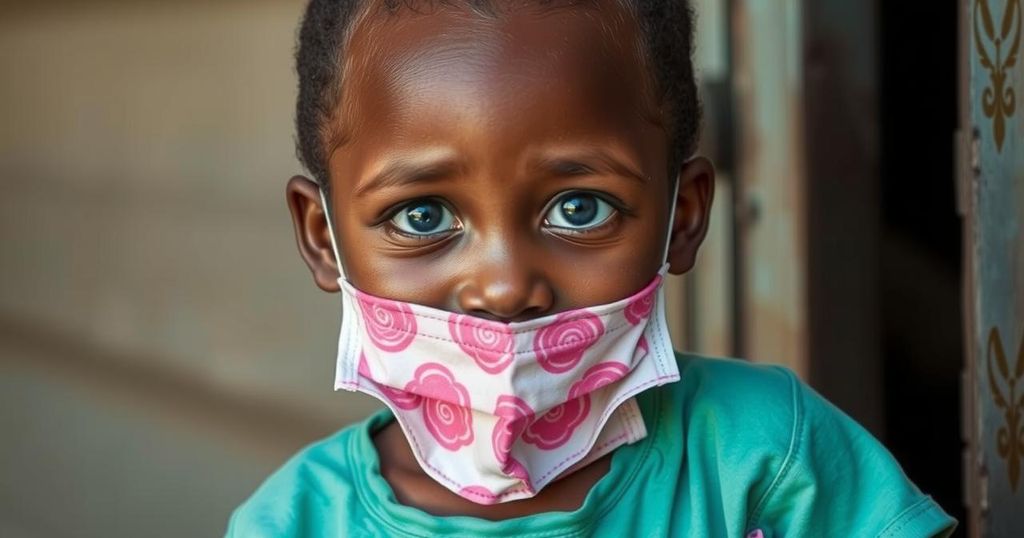Mysterious Illness in Congo Affects Over 400, Majority Are Children, WHO Reports

More than 400 people, mainly children, are infected with a mysterious illness in the Democratic Republic of Congo, with 31 reported deaths. The WHO has identified symptoms such as fever, cough, and anemia, and initial tests show the presence of malaria. A team of specialists is working to identify the disease in a region with limited access due to rainy season challenges.
The Democratic Republic of Congo is currently grappling with a mysterious disease that has infected over 400 individuals, resulting in 31 fatalities, predominantly among children, as reported by the World Health Organization (WHO). The outbreak, located in the Kwango province, was brought to the WHO’s attention just two weeks ago. Symptoms observed among the afflicted include flu-like manifestations such as headaches, cough, fever, breathing difficulties, and anemia. Notably, initial tests revealed that 10 out of 12 victims also tested positive for malaria, highlighting potential multiple illness occurrences among patients. Individuals severely affected by the disease also exhibited signs of malnutrition, which exacerbates vulnerability by diminishing immune responses.
In response to this alarming outbreak, a specialized team comprised of epidemiologists, clinicians, and infection control experts was dispatched to the Panzi region. However, the onset of the rainy season posed significant logistical challenges, resulting in a delayed arrival. Among the reported cases, children, particularly those under five years of age, constitute the majority of the affected population. WHO Director-General Tedros Adhanom Ghebreyesus indicated a discrepancy between earlier reports and current findings regarding the demographic most impacted, emphasizing the critical need for precise data collection and examination.
The geographical remoteness of the Panzi health zone further complicates access to healthcare services, with travel to the region from Kinshasa taking approximately 48 hours by road. Communication barriers have hindered the identification of the disease, necessitating the collection of new laboratory samples that are vital for determining the causative pathogen. Potential candidates include various viral infections such as influenza, pneumonia, COVID-19-like coronaviruses, and measles. Concurrently, researchers are investigating the transmission pathways to identify additional cases and fatalities.
The public health infrastructure in the Democratic Republic of Congo faces significant challenges, exacerbated by ongoing civil unrest, complicating the delivery of health services to numerous communities. In the backdrop of investigating the mysterious illness, WHO and local health authorities are simultaneously addressing an mpox outbreak affecting areas farther afield in the country, which has escalated into a significant health concern since 2024, with nearly 9,900 confirmed mpox cases reported. The ongoing health crises underline the vulnerable state of the nation’s healthcare system and the urgent need for international assistance and support in combating these threats.
The ongoing mysterious disease outbreak in the Democratic Republic of Congo highlights the severe health challenges faced in the region. The WHO has recently been alerted to this situation, revealing a high percentage of infections and fatalities among children. The combination of a weak healthcare infrastructure and civil unrest presents substantial barriers to effective health interventions. Moreover, the region is also contending with an mpox outbreak, further straining health resources and response capabilities. These factors collectively indicate a dire need for comprehensive health strategies and support systems.
In summary, the Democratic Republic of Congo is addressing a critical public health emergency involving a mysterious disease that predominantly affects children. The WHO is actively investigating the outbreak while coordinating the response, amidst challenging conditions relating to travel and communication. The situation is exacerbated by a prevailing mpox outbreak, underscoring the urgent and sustained effort required to bolster health services and address the underlying issues impacting healthcare delivery in this challenging environment.
Original Source: www.usatoday.com






